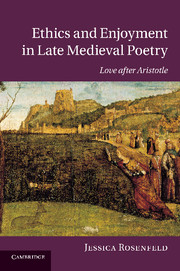Book contents
- Frontmatter
- Contents
- Acknowledgments
- Introduction: love after Aristotle
- 1 Enjoyment: a medieval history
- 2 Narcissus after Aristotle: love and ethics in Le Roman de la Rose
- 3 Metamorphoses of pleasure in the fourteenth-century dit amoureux
- 4 Love's knowledge: fabliau, allegory, and fourteenth-century anti-intellectualism
- 5 On human happiness: Dante, Chaucer, and the felicity of friendship
- Coda: Chaucer's philosophical women
- Notes
- Bibliography
- Index
- CAMBRIDGE STUDIES IN MEDIEVAL LITERATURE
Introduction: love after Aristotle
Published online by Cambridge University Press: 04 February 2011
- Frontmatter
- Contents
- Acknowledgments
- Introduction: love after Aristotle
- 1 Enjoyment: a medieval history
- 2 Narcissus after Aristotle: love and ethics in Le Roman de la Rose
- 3 Metamorphoses of pleasure in the fourteenth-century dit amoureux
- 4 Love's knowledge: fabliau, allegory, and fourteenth-century anti-intellectualism
- 5 On human happiness: Dante, Chaucer, and the felicity of friendship
- Coda: Chaucer's philosophical women
- Notes
- Bibliography
- Index
- CAMBRIDGE STUDIES IN MEDIEVAL LITERATURE
Summary
The story of the impact of the late medieval Latin translation of Aristotle has been told and retold for the fields of medieval philosophy and theology. This book tells the story for the medieval English literature of love. The existence of such a narrative might seem unlikely, given the distance between the discourses of a highly specialized, university-centered, Latinate medieval philosophy and an entertainment-oriented, court-centered, vernacular poetry, but it is the late medieval configuration of ethics that brings these two worlds together. Medieval commentators considered poetry to be an ethical genre, typically referring to poetry's interest in human behavior and moral choices to justify this classification. As the field of philosophy constituted by both practical and abstract considerations of virtuous action, desire, and relationships, it is even now not terribly controversial to claim that moral philosophy is involved with the same kinds of human experience as poetry. Yet the medieval emphasis on love as a central ethical concern meant that – from the moment of the “birth” of the vernacular literature of love – philosophy and poetry were yoked together in often surprising ways by a shared language of longing, despair, pleasure, and union. Vernacular poetry constituted a site for thinking through ethical problems such as conflicting loyalties, conflicting emotions, and the necessity for self-sacrifice within the larger context of the pursuit of erotic enjoyment; clerkly ethical concerns with spiritual culpability and love of God were transformed and given voice in a context of pursuits of human justice, love, and happiness.
- Type
- Chapter
- Information
- Ethics and Enjoyment in Late Medieval PoetryLove after Aristotle, pp. 1 - 13Publisher: Cambridge University PressPrint publication year: 2010



